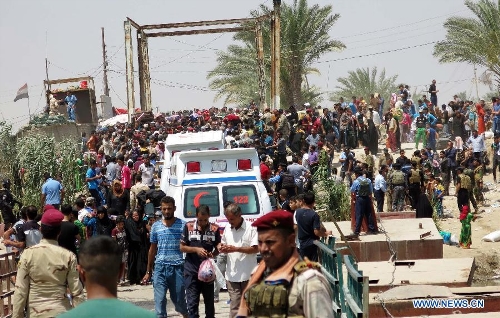HOME >> WORLD
IS forces seize last Iraq-Syria crossing
By AFP – Reuters Source:AFP - Reuters Published: 2015-5-23 0:03:53
Obama calls move ‘tactical setback,’ denies US ‘losing’

Iraqi people who escaped from the area controlled by the Islamic State (IS) militants in Iraq's Ramadi cross the Bzibz bridge in south Fallujah on their way to Baghdad on May 20, 2015. (Xinhua/Khalil Dawood)
The Islamic State (IS) group consolidated its control of the Iraq-Syria border Friday after capturing an Iraqi provincial capital and a famed Syrian heritage site in an offensive that has forced a review of US strategy.
The jihadists, who now control roughly half of Syria, reinforced their self-declared transfrontier "caliphate" with the capture of the Al-Tanaf to Al-Walid crossing on the Damascus-Baghdad highway late on Thursday.
It was the last border crossing with Iraq still held by the Damascus government. Save for a short section of frontier in the north under Kurdish control, all the rest are now held by IS.
The jihadist surge, which has also seen them capture Anbar capital Ramadi and the ancient Syrian city of Palmyra in the past week, comes despite eight months of US-led air strikes aimed at pushing them back.
It has sparked an exodus of tens of thousands of fearful civilians in both countries and raised fears that the jihadists will repeat at Palmyra the destruction they have already wreaked at ancient sites in Iraq.
The UN said Friday that around 55,000 people had fled Ramadi since a surge by the Is in mid-May.
The Iraqi government and allied forces will launch an offensive aimed at retaking the city of Ramadi from the Islamic State group in the coming days, a spokesman said on Friday.
President Barack Obama played down the IS advance as a tactical "setback" and denied the US-led coalition was "losing" to IS. But French President Francois Hollande said the world must act to stop the extremists and save Palmyra.
UNESCO chief Irina Bokova called the ruins, which date to the 1st century AD, "the birthplace of human civilization," adding: "It belongs to the whole of humanity and I think everyone today should be worried about what is happening."
As the jihadists fanned out across Palmyra on Thursday, they went door to door executing suspected loyalists of the Damascus government, the Syrian Observatory for Human Rights said.
At least 17 people were killed, the Britain-based monitoring group said.
IS proclaimed Palmyra's capture online and posted video and stills footage of its fighters in the city's air base and prison, long notorious for its detention of regime opponents.
The jihadists did not immediately post pictures of the UNESCO-listed world heritage site with its colonnaded streets, elaborately decorated tombs and temples.
IS sparked international outrage this year when it blew up the ancient Assyrian city of Nimrud in northern Iraq.
Syria's antiquities director Mamoun Abdulkarim said he feared a similar fate awaits Palmyra, and urged the world to "mobilize" to save it.
IS now controls "more than 95,000 square kilometers in Syria, which is 50 percent of the country's territory," the Observatory said.
Fabrice Balanche, a French expert on Syria, said "IS now dominates central Syria, a crossroads of primary importance" that could allow it to advance towards the capital and third city Homs.
The jihadist rivals of IS, Al-Qaeda affiliate Al-Nusra Front, have also been on the offensive as part of a rebel alliance that has stormed through nearly all of the northwestern province of Idlib. The Islamist rebels on Friday overran a hospital in the town of Jisr al-Shughur where at least 150 regime forces and dozens of civilians were trapped for nearly a month, the Observatory said. It said dozens managed to escape but despite a pledge from President Bashar al-Assad to rescue them, others were killed.
Palmyra's takeover came days after IS seized the Iraqi city of Ramadi, their most significant victory since their lighting advance across swathes of northern Iraq last summer.
On Thursday, IS pushed further and seized Iraqi positions east of Ramadi, officials said. Obama blamed the fall of Ramadi on a lack of training and reinforcements for the city's garrison. "I don't think we're losing," he told news magazine The Atlantic.
"The training of Iraqi security forces, the fortifications, the command-and-control systems are not happening fast enough in Anbar, in the Sunni parts of the country."
One of Iraq's leading Sunni Arab politicians, Deputy Prime Minister Saleh Mutlaq, called for a change of US strategy. Recruiting Sunni tribes is "important but not enough," he said, adding that in any case it was "too late."
On Thursday, IS claimed on Twitter the responsibility for a bombing attack at a Shi'ite Houthi mosque in the Yemeni capital Sanaa on Friday, wounding 13 people.
According to a security source in Sanaa two out of the 13 wounded were in critical condition. The source added that the bomb was planted inside the mosque before Friday prayers. Earlier this year, a group of Islamist fighters in Yemen renounced their loyalty to al Qaeda's leader and pledged allegiance to the head of IS.
Posted in: Mid-East